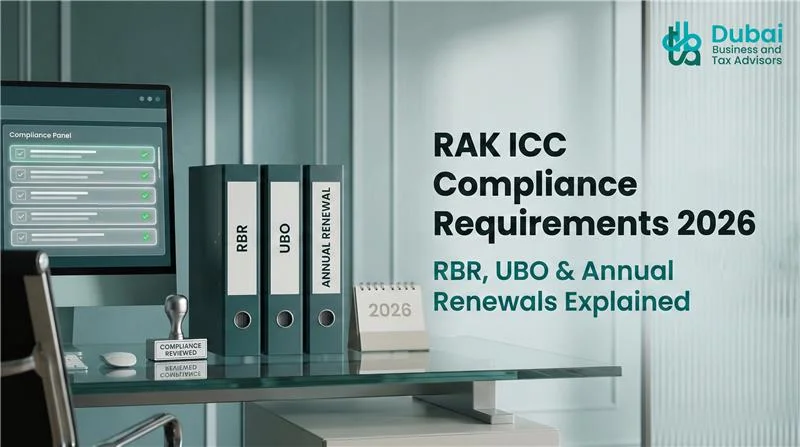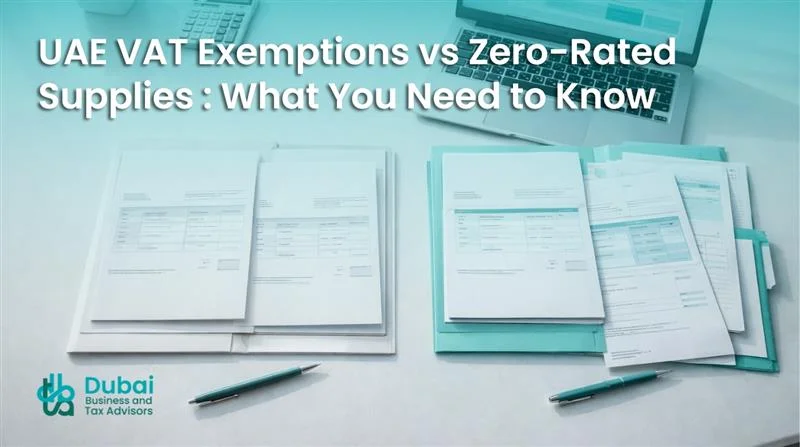Streamline Your Corporate Tax Journey in the UAE with DBTA
As the UAE’s corporate tax regime evolves, compliance and strategy go hand in hand. At Dubai Business & Tax Advisors, we guide you from UAE corporate tax registration to effective corporate tax planning, ensuring alignment with the corporate tax law UAE and safeguarding against penalties. Whether you are in Dubai, or operating cross-jurisdictionally, our senior advisors deliver clarity, structure and peace of mind.

- 10+ Years Of Experience
- 1500+ Audit Completed
- Financial Experts
- 2500+ Consultation
Why Corporate Tax Is Critical for Your Business
In today’s interconnected economy, corporate tax in UAE is not just a compliance burden, it’s a strategic lever. An incorrect structure or delayed registration can expose your company to UAE corporate tax penalty risks, while a well-planned approach can free up capital for growth. Businesses that ignore the implications of corporate tax law UAE may be caught off guard by hidden costs or lost optimization opportunities.
Moreover, with the introduction of corporate tax in Dubai, all mainland, free zone, and offshore companies (in many cases) must assess their corporate tax registration eligibility and align with their fiscal obligations. Even businesses earning below the threshold require registration, which means early engagement with this topic is essential.
Finally, the UAE’s new regime sits within a broader regional and global context, from Saudi corporate tax to structures in Oman or Bahrain, and the rising influence of OECD rules, missteps in one jurisdiction can cascade across the group.
When you partner with DBTA, you benefit from our deep cross-border tax insight. We help you:
- Map out whether corporate tax registration Dubai is required for your entity
- Navigate corporate tax planning strategies tailored to your industry
- Identify structures that minimize exposure to corporate tax in Oman / Bahrain / Saudi Arabia
- Stay ahead of corporate tax consultant best practices and avoid penalties

Our Scope in Corporate Tax & Advisory
As the corporate tax regime in UAE continues to evolve, companies face more complex obligations, from registration and compliance to cross-jurisdiction structuring and reporting. DBTA brings years of tax advisory experience across the UAE, the UK, and GCC regions to help businesses meet their obligations confidently and strategically.
Our approach ensures you not only remain compliant under corporate tax law UAE, but also optimize your entity structure in relation to corporate tax in Dubai and neighboring jurisdictions. Whether you’re looking to expand, reorganize, or simply meet your filing requirements, we guide you at every step.
What Our Corporate Tax Advisory Covers
- Corporate tax registration in UAE / Dubai, including free zones and offshore entities
- Review of corporate tax registration eligibility for existing or new entities
- Preparation and filing of your corporation tax return in line with FTA standards
- Development of corporate tax planning strategies to minimise liability
- Assessment of transfer pricing, intercompany transactions, and BEPS compliance
- Structuring support across UAE, Oman, Bahrain, Saudi Arabia for multi-jurisdiction groups
- Advisory on corporate tax penalties, appeals, and risk mitigation
- Ongoing consultancy as your corporate tax consultant, with proactive reviews and updates
Why Choose DBTA for Your Corporate Tax Needs?
At Dubai Business & Tax Advisors, we merge global expertise with local insight. From corporate tax registration to ongoing compliance and planning, we act as your strategic advisor, handling complexity, protecting value, and enabling growth with confidence.
When you work with us, you gain:
- Complete corporate tax registration in Dubai support
- Tailored corporate tax planning for your unique structure
- Transparent, predictable pricing
- Direct access to senior consultants for deep issues
Still deciding the right compliance partner? Let us guide you.
Expertise
We deploy UK-credentialed tax professionals and UAE regulatory specialists to design precise, resilient corporate tax structures that comply with local law and international standards.
Ease
We take over all intricate tasks, from filing deadlines to data collection and tracking, so your team can stay focused on core business goals without tax distractions.
Clarity
We communicate in plain English, using visual aids, summaries, and scenario breakdowns to make corporate tax in UAE understandable and actionable for decision-makers.
Process of Corporate Tax Registration & Compliance in the UAE
Below is a step-by-step outline to help your business register for corporate tax, maintain compliance, and avoid penalties. DBTA supports you at each stage, from profile setup to ongoing adherence with corporate tax law UAE.

Setup EmaraTax Profile
Create or log into your EmaraTax portal account and establish or select a “Taxable Person” profile. This becomes your official interface with the FTA for registration, correspondence, filings, and compliance oversight.

Complete Registration Application
Within EmaraTax, choose “Register for Corporate Tax.” Provide entity info, business activities, accounting period, and authorized signatories. Upload required documents carefully to avoid delays or queries from the FTA.

FTA Review & TRN Issuance
The FTA reviews your application. If all is in order, you’ll receive your Tax Registration Number (TRN) within around 20 business days. If not, the FTA may request clarifications or supplementary documents.
File Corporate Tax Return
After your fiscal year ends, you must file your corporation tax return within nine months via EmaraTax. Disclose taxable income, allowances, reliefs, and ensure reporting aligns with UAE CT rules.
Ongoing Compliance & Monitoring
Maintain accurate books, monitor legislative updates, respond to FTA queries, and revise corporate tax planning as needed. Continuous oversight helps keep you compliant and reduces the risk of fines or reassessments.
What Damages Can Delaying Corporate Tax Cause Your Business?
Delaying corporate tax registration, filing or payment can expose your business to serious financial, regulatory, and reputational harm. The UAE’s Federal Tax Authority (FTA) has strict enforcement rules, and late action can trigger escalating fines, interest, audits, and lost strategic opportunities.
delayed tax and compliance include:
- A fixed AED 10,000 penalty applies for late corporate tax registration under Cabinet Decision No. 10 of 2024.
- Late return filing incurs AED 500 per month (first 12 months), rising to AED 1,000 per month thereafter.
- Unpaid tax triggers interest at 14% per annum, calculated monthly, on the outstanding amount.
- Inaccurate or false returns may lead to fixed penalties or additional fines for misreporting.
- Non-cooperation with audits or requests can result in AED 20,000 fines and forced assessments.
- Poor record keeping may draw penalties between AED 10,000 to AED 50,000 depending on severity.
- Repeated violations or repeated failure to notify changes can escalate penalties (e.g. AED 1,000 or more per violation).
Delays also attract increased FTA scrutiny, risk of license sanctions, adverse credit and business reputation impact, and potential limitations on regulatory approvals. Acting swiftly helps maintain compliance, preserve trust, and steer clear of avoidable losses.


Let’s Get Started with Your Corporate Tax Compliance
Take charge of your compliance journey with DBTA guiding you. From corporate tax registration to optimized structuring and filings, our team ensures your business is fully aligned with FTA requirements, shielding you from risk and giving clarity to your financial planning.
- Complete support for corporate tax registration in the UAE / Dubai
- Preparation and submission of your corporation tax return with precision
- Custom corporate tax planning geared toward your corporate structure
- Transparent, fixed-fee pricing, no hidden costs or surprises
- Direct access to senior tax advisors for tailored strategy and oversight
By engaging DBTA at this stage, you gain more than just a compliance partner, you gain a strategic adviser. We assess your unique business model, anticipate future tax exposures (such as the upcoming 15% top-up tax for multinationals ), and embed safeguards into your tax architecture. As your business evolves, our proactive guidance ensures your structure remains resilient and tax-efficient.
Don’t delay, the cost of non-compliance can quickly spiral into penalties, interest, reputational damage, and unnecessary audits. Reach out now for a consultation and let DBTA design your corporate tax journey with confidence, clarity, and long-term security.
FAQs – Corporate Tax in Dubai
Who is liable for corporate tax in the UAE?
All juridical persons incorporated or established in the UAE, those effectively managed and controlled in the UAE, and foreign entities that have a permanent establishment there are liable. Free zone entities must register even if they qualify for 0 % on qualifying income. Individuals may be liable only if engaged in business.
Do free zone companies automatically get exempt status?
No. Free zone companies must actively satisfy strict conditions, such as economic substance, audited financials, and arm’s-length transfer pricing, to be considered a Qualifying Free Zone Person and receive 0 % tax on qualifying income. Failure to meet these criteria subjects them to the standard 9 % rate.
Is the corporate tax regime the same across all Emirates?
Yes. Corporate tax in the UAE is a federal regime and applies uniformly in Dubai, Abu Dhabi, Sharjah, and all emirates. Local distinctions only arise in special cases (e.g. extractive industries taxed at emirate level).
Do branches of foreign companies pay corporate tax in UAE?
Yes. A foreign company’s branch (permanent establishment) in UAE must include income attributable to that branch in its UAE tax reporting. The parent company may also need to consider treaty relief, but the branch is taxed as part of the overall corporate tax framework.
Are natural persons subject to corporate tax?
Generally no. Natural persons (individuals) are not subject to corporate tax unless they operate a licensed business or commercial activity under law, in which case their income from that business may fall under CT obligations. Salary, bank interest, and personal investments remain excluded.
Is income from dividends taxed?
Income from dividends and other profit distributions earned by a UAE taxable person from UAE resident shareholdings is generally exempt, provided conditions are met. Capital gains from qualifying participations may also be exempt under participation exemption rules.
What is “qualifying income” for free zone entities?
“Qualifying income” refers to income generated by a free zone entity from eligible transactions (such as sales outside UAE or permitted services) that meet substance, transfer pricing, and economic requirements. Non-qualifying income is taxed at 9 %.
Will exempt persons exist under corporate tax?
Yes. Exempt persons include government entities, public benefit entities, pension or social security funds, and investment funds that meet criteria defined by the FTA. They don’t necessarily need full corporate tax registration unless participating in business activities.
Does the banking or extractive sector face special treatment?
Yes. Entities in natural resource extraction remain taxed at the emirate level (outside federal CT). Banks and insurers are taxable under CT and must comply with standard rules, though interest deduction caps may not apply to them.
Are real estate development and property firms included?
Yes. Real estate developers, property management, and brokerage entities are within CT scope. They must register, file returns, and compute taxable profits under UAE corporate tax rules like any other sector under the law.
What is the standard corporate tax rate in the UAE?
In the UAE, business profits exceeding AED 375,000 are taxed at 9% under the corporate tax regime. Profits up to that threshold are taxed at 0%. This structure aims to support small enterprises while ensuring revenue from higher profit brackets.
Does the 0% rate apply to free zone companies?
Yes, Qualifying Free Zone Persons (QFZPs) may benefit from a 0% rate on their qualifying income, provided they satisfy substance, documentation, and other regulatory tests. However, their non-qualifying income remains subject to the standard 9%.
What happens if a free zone company has non-qualifying income?
Non-qualifying income earned by a QFZP is taxed at the standard 9% corporate tax rate. If the non-qualifying income exceeds allowable thresholds, it may jeopardize the free zone benefits.
What are the “de minimis” rules for free zone companies?
Free zone entities may retain their 0% status if their non-qualifying income does not exceed AED 5 million or 5% of total revenue, whichever is lower. Exceeding this threshold may lead to full taxation at 9%
Are dividends and capital gains exempt from corporate tax?
Yes. Dividends and capital gains from qualifying UAE shareholdings and intra-group reorganisations are typically exempt if conditions are satisfied, helping prevent double taxation within corporate groups.
Can income from intra-group reorganisations be exempt?
Yes, as long as conditions are met (e.g. asset continuity, shareholder ownership, timing), intra-group reorganisations and transfers may not trigger corporate tax, preserving group efficiency and flexibility.
Will my foreign taxes be credited against UAE corporate tax?
In many cases, foreign corporate taxes paid on income that is taxable in UAE may qualify for a foreign tax credit, subject to limitations, thereby preventing double taxation and preserving fairness in cross-border operations.
Do increased rates apply to multinationals under top-up tax rules?
Yes. From 2025, large multinationals meeting global revenue thresholds will face a 15% minimum top-up tax under OECD Pillar 2 rules, ensuring their effective tax rate meets international benchmarks.
Are there industries wholly exempt from corporate tax in UAE?
Yes. Entities in natural resource extraction remain under emirate-level tax regimes, exempt from federal corporate tax. Also, qualifying dividends, capital gains, and intra-group transfers may receive exemptions.
What rate applies to companies with low profits?
Companies with taxable income up to AED 375,000 are taxed at 0%, giving relief to smaller businesses. Only profits above that threshold attract the 9% corporate tax.
How do I register for corporate tax in UAE?
Registration is done via the EmaraTax portal, managed by the FTA. You log in or sign up, create/select a “Taxable Person” profile, input your business details, upload valid documents (trade license, ownership, signatories), and submit. The process is free and typically takes around 30 minutes.
What documents are required for corporate tax registration
You’ll need a valid trade license, passport or Emirates ID of authorized signatories, proof of ownership structure (MOA/AOA), registered address, and bank account details. For juridical entities, authorization evidence (e.g. board resolution) may also be required.
When must businesses register for corporate tax?
Entities licensed before 1 June 2023 had deadlines tied to license issue month (e.g. 31 May or 30 June 2024). For new entities post 1 March 2024, registration is required within three months from date of incorporation or recognition.
Is there a registration fee for corporate tax?
No. The FTA imposes no registration fee for corporate tax registration using EmaraTax. The service is provided free of charge to all taxable persons.
Do branches need a separate registration?
No. A branch of a juridical entity in UAE is not treated as a separate legal entity for CT. It is covered under the parent’s registration, so no distinct registration is necessary for branches.
When must corporate tax returns be filed?
Returns must be submitted within nine months after the end of your tax period (fiscal year end). The form is submitted online via EmaraTax.
Can you file a return if there is no taxable income?
Yes. Even if your profits fall below AED 375,000 (i.e., 0% tax), you are still required to file a corporate tax return to declare that and maintain compliance.
What schedules are required in the return?
The CT return includes schedules for business financials, qualifying/non-qualifying income (for Free Zone), elections (e.g. realisation basis, small business relief), and intercompany adjustments. The form dynamically reveals relevant sections.
Can CT Returns be amended after submission?
Yes. If errors or omissions are identified, you may request amendments before certain deadlines or in response to FTA review. The amended return must follow FTA rules on corrections and disclosures.
Are there language or translation requirements for filings?
Yes. Documents submitted may need to be in Arabic or accompanied by certified Arabic translations when requested by the FTA. This applies especially to legal entity documents and contracts within CT submissions.
What is the penalty for late corporate tax registration?
If a person required to register for corporate tax does not submit the registration application within the timeframe, an AED 10,000 administrative fine is imposed under Cabinet Decision No. 10 of 2024. The FTA may waive or refund this if first return is filed within the special 7-month window.
What fines apply for late tax return filing?
If you fail to file the corporate tax return by the specified date, a penalty of AED 500 per month is applied for the first 12 months. After 12 months, that increases to AED 1,000 per month for subsequent months.
What interest is charged on unpaid corporate tax?
Unpaid corporate tax amounts attract interest at 14% per annum, calculated monthly, from the day following the due date until full settlement. This interest increases the financial burden of non-payment over time.
What penalties arise from misreporting or false returns?
Submitting incorrect, misleading, or false information in a tax return may result in a fixed penalty (e.g. AED 500) plus additional penalties based on the tax difference (e.g. 15% surcharge). The FTA may treat it as a violation warranting audit and heavier sanctions.
What happens if documents are incomplete or missing?
If required books, accounts, or supporting documents are not submitted, a penalty (up to AED 10,000) per violation applies. Repeated non-submission within 24 months can escalate fines to AED 20,000 under Cabinet Decision No. 75, 2023.
What penalties for failure to update tax record changes?
If a taxable person fails to notify the FTA of changes (e.g. in ownership, address, legal representatives), a fine of AED 1,000 applies per violation. If repeated within 24 months, the fine may increase to AED 5,000.
Will repeated breaches escalate penalties?
Yes. Repeated violations within 24 months (e.g. failing record keeping, late filings, failing notifications) attract higher fines (e.g. AED 5,000) under decision schedules. Persistent non-compliance and refusal to comply may lead to more serious enforcement action.
Can a late-registration penalty be waived or refunded?
Yes. The FTA and Cabinet have introduced a waiver/ refund initiative for the AED 10,000 late registration penalty if the first corporate tax return (or declaration) is submitted within seven months of the first tax period’s end. If already paid, the amount may be credited to the EmaraTax account or refunded.
Can penalties retroactively apply to earlier tax periods?
Yes. If a business fails to register, file, or comply for earlier periods, the FTA may open audits or assessments with associated penalties and interest. These can extend back several years depending on statute of limitations or regulatory scope.
Could non-compliance impact business licenses or reputation?
Yes, beyond financial penalties, persistent non-compliance risks trade license suspension, regulatory restrictions, scrutiny by authorities, investor distrust, and reputational damage.
Our Trusted Partners





Our Client Testimonials
Our clients, ranging from startups to multinational corporations in Dubai, benefit from our comprehensive and strategic approach to business advisory. Our team of highly qualified business and tax advisors takes pride in ensuring regulatory compliance, operational efficiency, and sustainable long-term success for businesses across various industries





Khalid Al Rashid
Layla Hassan
Omar Saeed
Noor Al Mazrouei
Faisal Hamdan
Connect with Reliable Dubai Business Consultants
Certified Chartered Accountants
Be stress-free with top-tier accounting and financial expertise in Dubai.
Ensure Data Confidentiality
Using advanced accounting technology and controls for data security.
Achieve Measurable Results
Making sure your financial strategy aligns with your goals and objectives.
Speak to an Expert! Call Now for a Free Consultation. +971568191060 or





